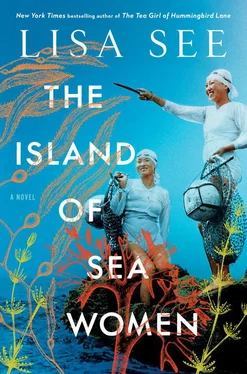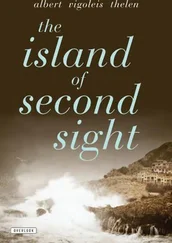“So,” she said, breaking another long silence, “I did what I could for Joon-lee. Yo-chan and I visited her in Jeju City when we came to the island to see Sang-mun’s parents. When she arrived in Seoul—”
“You had Yo-chan hunt her down.”
“ Hyng! It was far from that! They bumped into each other on the campus. I never expected them to fall in love, but they did. I saw it on their faces the first time he brought her to the apartment. It was fate, don’t you see?”
“Do Catholics believe in fate?” I asked.
She blinked rapidly. She could accept my hatred, but she wouldn’t allow me to mock her faith. Interesting.
“Joon-lee’s been on her own a very long time,” she said. “I’ve tried, when possible, to be a second mother to her. I love Joon-lee, and I’ve done my best to help her.”
“You mean you tried to steal her from me.”
Mi-ja’s cheeks colored, and she shook a finger in front of my face. “No, no, no.”
Good, I’d finally gotten to her. Maybe now she’d speak truthfully. But then she took a breath, her cheeks paled, and she returned to the unnerving calm she seemed to have perfected.
“There’s no point in trying to share my heart with you,” she said. “Your anger has poisoned you. You’ve become like Halmang Juseung. You touch everything with the flower of demolition. You’re killing all that is beautiful—our friendship, your love for Joon-lee, the happiness of a young couple.” She rose and padded across the floor. When she reached the door, she turned back to me. “Joon-lee told me that you’ve been taking care of my house. Why?”
“I thought… I don’t know what I thought,” I confessed, because my years of believing that I’d be ready when she came back had turned out to be false. I hadn’t been prepared for any of this.
“I thank you anyway.” She lifted her chin as she added, “The ceremony will be tomorrow at the church, as I told you earlier. The banquet will be at my aunt and uncle’s home. You are welcome to attend. The children would love to have you with them on their joyous day.”
But as much as I loved my daughter, I couldn’t go to her wedding. First and foremost, it would have been disrespectful to her father, brother, and aunt. On another level, I was too hurt by Joon-lee’s years of lies and broken promises even to want to see her face. I would have to overcome a lot within myself to break through the barriers that now separated us. So, the next day, I stayed with Min-lee—who also refused to attend the wedding—and her family through the long, hot hours until night finally fell. They rolled out sleeping mats in the main room, so we could all be together. The children fell asleep. Min-lee’s husband snored lightly. But Min-lee and I went outside, sat on the step, held hands, and listened to the music, songs, and laughter that wafted from the other side of the village.
“So many bad memories,” Min-lee whispered. “So much pain.”
I patted her back as she quietly wept. She and I would never be the same after what we’d seen and lost twenty-three years ago, but that could also be said for most people on the island. On this night, I couldn’t take my mind from Jun-bu, what he’d wished for our children, and what he’d feared for them. For a tree that has many branches, even a small breeze will shake some loose. We had grown a tree with many branches. One son had died too soon, but we now had grandchildren who would ensure our family’s line. But wherever Jun-bu was, could he be disappointed in Joon-lee and even more disappointed in me for how I’d raised her? For me, the pride of my life, my youngest daughter, was the branch who’d broken off in a way I never expected. By joining Mi-ja’s family, she had shattered my heart.
_____
Fourteen months later, on a sultry fall morning, I walked my twin grandsons to school. They usually went with their father, but he’d needed to leave the house early to attend a meeting. We saw other children in the olles. The girls wore school uniforms: a dark blue skirt, white blouse, and wide-brimmed sunhat. The boys wore blue pants and white shirts. We met a teacher as we neared the school. Jun-bu had always worn traditional clothes made of persimmon-dyed fabric to teach, but these days the instructors wore their own version of a uniform: slacks, white shirts, and ties. We bowed to show our respect. The teacher nodded to us and continued purposefully in the direction of the high school. When we reached the elementary school, I gave each grandchild a tangerine. These days, teachers in Hado expected to find tangerines placed in a neat stack on their desks every morning, and I was proud that my grandchildren could participate in that. I watched them run inside, and then I went back home. Min-lee waited for me much as I’d left her, sitting on a low stone wall, holding an envelope in her hand. This was the first letter Joon-lee had sent since her wedding.
“Are you ready?” she asked.
“Open it.”
Min-lee slit open the envelope. Money fluttered out of it, which we quickly gathered. Then she began to read: “ ‘Dear Mother and Sister, I’ve given birth to a baby girl. She’s healthy, and I’m fine. We’ve named her Ji-young. I’m hoping you’ve softened toward me and my husband these past months and will come to Seoul to meet her. I’ve enclosed money for your travel expenses. We’ll be moving to America in December. Yo-chan will be working at Samsung’s office in Los Angeles. I’m hoping to become a student at UCLA, so I can finish my degree. I’m not sure when we’ll be back, so you must come see us. Mother, you’ve always said that children are hope and joy. Ji-young is hope and joy to us. I hope she will be to you too. With love and respect, Joon-lee.’ ”
Min-lee’s voice trailed off. She studied me, trying to get a sense of my feelings. I was ripped up inside. I had a new grandchild. Such a blessing. But that child was also the grandchild of the woman who’d nearly destroyed my life.
“If you want to go,” Min-lee said tentatively, “I’ll take time off from work and come with you. Would you like that?”
“You’re a good daughter,” I said, “but let me think about it.”
A flash of hurt crossed Min-lee’s face.
“Don’t misunderstand,” I said. “If I go, I’d love for you to come with me. You’ve always been a perfect daughter, and I’d need you. But I’m not sure if I’ll go.”
“But, Mother, it’s Joon-lee. The baby…”
I slowly rose. “Just let me think for a bit.”
All that day and all that night I tortured myself with what I should do. In the deepest hours of darkness, I realized I needed advice from Shaman Kim. I followed the proper customs to prepare myself. I gave myself a sponge bath and dressed in clean clothes. I searched my mind for any contaminating activities I might have participated in and found none. I hadn’t drunk rice liquor recently, nor had I argued with friends, family members, or women in the bulteok. I no longer had my monthly bleeding. I wasn’t sharing love with anyone. I hadn’t butchered a pig, chicken, or duck, nor had I harvested any marine creatures in the past week.
The sun had not yet risen when I put on my white kerchief and left the house with a basket filled with rice cakes and other offerings over my arm. I found Shaman Kim and her daughter at a makeshift shrine for Halmang Yeongdeung—the goddess of the wind. Shaman Kim was quite old now, and her daughter was training to take her place.
“Visiting the goddess is like visiting one’s grandmother,” Shaman Kim recited when she saw me. “It’s always best to arrive at a goddess’s shrine close to dawn, when she is sure to be in residence. You can say anything, and she will listen. You can cry, and she will console you. You can complain, and she will be patient.” Shaman Kim motioned for me to sit. “How can we help you?”
Читать дальше












